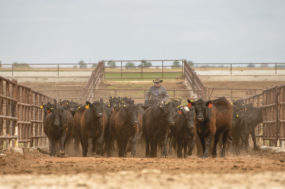Carbon contracts are the current hot topic in agriculture. Essentially, a landowner or agricultural producer enters into a contract with a company or broker seeking to purchase carbon credits.
The landowner or ag producer agrees to undertake certain practices designed to increase carbon in the soil, and the company or broker pays them in return for doing so. For rangeland, the desired practice is usually the use of regenerative grazing. There are, as with any contract, a number of important legal considerations to keep in mind when considering and negotiating a carbon contract. Here are just a few questions to ask before signing on the dotted line.
- Are all promises included in the contract? This may seem simple, but it is critical before signing a carbon contract that producers and landowners take the time to thoroughly read the contract. They need to be sure all promises made by the purchaser are included in the written contract. Without being a part of the contract, verbal assurances will likely not be enforceable.
- What practices are required to be undertaken? Ensure the contract expressly lays out the exact practices required to be done by the landowner or producer. Vague terms like “conservation practices” should be cause for alarm. Instead, the landowner or producer should understand exactly what he or she will be required to do in order to comply with the contractual terms.
- How long will the contract last? It is important to understand the term of the contract. Most contracts have a set time frame for which they are in place. Be sure to watch for any options to extend the contract beyond the listed term. Also take care to understand what rights either party has to terminate the contract prior to expiration.
- How will payments be structured? There are a number of ways payments may be structured in these contracts. Some pay a flat fee per acre on any land where a required practice is adopted. Others pay based on an increase of carbon in the soil, based either on modeling or on actual measurements. For these types of contracts, producers and landowners should investigate the carbon storage potential in their particular area. This can vary greatly across the country and even within a particular area having significantly different soil types. Still others may be based on a particular carbon market at a given time.
- How will verification occur? A contract should set forth how verification of carbon storage should be measured. For example, will the contract base sequestration (and possibly payments) on modeling, or will actual measurements be taken? If actual measurements will be used, it is important to determine how measurements will be taken. For example, the depth of soil sampling can have a significant impact on the amount of carbon. Another important question for contracts using actual measurements is what will be measured. For example, some contracts measure metric tons of carbon, while others look at carbon dioxide equivalent, which takes into account other greenhouse gases as well. A contract should also address who will bear the costs of verification.
- What other uses may be allowed on the land during the term of the contract? Many producers have diversified operations on rangeland they may want to continue even if they enter into a carbon contract. The agreement should address which activities will be allowed. For example, is hunting still permissible on the property enrolled in a carbon program? If so, are there any specific limitations that must be agreed to?
- What penalties apply if carbon is not sequestered as planned? It is critical to understand what penalties exist in a contract if things do not go as planned. For example, if measurements show there was actually no additional carbon in the soil after the required practices are done, what penalties apply? Are penalties in place for anything that happens or only for intentional acts of the landowner or producer? What happens if a weather event or other natural disaster occurs and causes problems for the parties to the agreement? All of these issues need to be carefully addressed in the agreement.
- Are there prohibitions on stacking? Most carbon agreements have a clause prohibiting stacking. These clauses essentially say a landowner may not enroll the same land in more than one carbon contract. Some of the clauses, however, are written more broadly and may also disqualify the landowner from participating in other government programs such as the Conservation Reserve Program (CRP) or Environmental Quality Incentives Program (EQIP). Carefully consider the breadth of the stacking prohibition.
PHOTO: Getty Images.









